
May 2017
The ASPHO Advocacy Brief
Welcome to the Advocacy Brief, a quarterly offering from the American Society of Pediatric Hematology/Oncology. The goal of this e-newsletter is to inform members about legislative and regulatory issues impacting the profession of pediatric hematology/oncology and the patients we serve.
*Send your health policy and advocacy news to This email address is being protected from spambots. You need JavaScript enabled to view it. .
Special Features
What’s Going on in Health Care?
Jordan Wildermuth, MSW, Health Policy & Advocacy Manager
At a recent meeting I attended, a former governor and secretary at the Department of Health and Human Services (HHS) began by asking the rhetorical question of what is going on in health care. His answer was a blunt “who knows.” The ongoing confusion over the repeal and replacement of the Affordable Care Act (ACA) impacts most other health-related issues, as this was a 2016 campaign promise by a majority of Republicans and they are facing pressure from constituents to act.
At its introduction, the American Health Care Act (AHCA) seemed to be the cut-and-dry repeal and replace option, but then a group of conservative Republicans in the House of Representatives dubbed the Freedom Caucus rose up in opposition and undermined the bill’s passage because it did not provide some of the far-reaching reforms they desired and because it still looked too much like the ACA. After 2 days of vote counting and a visit to Capitol Hill from President Trump, the bill was pronounced dead by Speaker Paul Ryan.
The Trump Administration seemed to be happily moving on to tax reform, when from the ashes rose a compromise bill. Out of discussions between the Freedom Caucus, Speaker Ryan, and Vice President Pence, Freedom Caucus-favored provisions were retained, including states’ ability to waive the requirement for them to apply for waivers to key ACA insurance mandates such as the essential health benefits. Moderate Republicans were hesitant to support the bill until an amendment was proposed to add additional funding to support the high risk pools created by the legislation. The House of Representatives passed the AHCA on May 4 by a vote of 217-213. The legislation faces an uphill battle in the Senate as Senators have stated that they are working on their own health care bill.
What does this mean for ASPHO?
What happens next is probably a function of timelines. I believe repeal and replace will be taken off the fast track as the Senate works on their version of the AHCA and focus will turn to appropriations because the current continuing resolution expires at the end of September. There are also a number of health-related issues facing reauthorizations, such as the Children’s Health Insurance Program and the user fee programs for pharmaceuticals, generic drugs, medical devices and biosimilars from 2018 to 2022. This opens the door for discussions on amendments to the Best Pharmaceuticals for Children Act and the Pediatric Research Equity Act. I expect the Childhood Cancer STAR Act to begin to move through Congress once some of the noise has died down, perhaps in fall 2017.
One of the main drivers of legislation is what members of Congress hear from their constituents about what is important to them. The more constituents raise the issue, the more attention it receives. Even in this time of uncertainty, we need to keep ASPHO’s issues on the minds of Congressional members.
Take Action on the Childhood Cancer STAR Act
On February 3, 2017, Senators Jack Reed (D-RI), Shelley Moore Capito (R-WV), Chris Van Hollen (D-MD), and Johnny Isakson (R-GA) as well as Representatives Michael McCaul (R-TX), Jackie Speier (D-CA), Mike Kelly (R-PA), and G.K. Butterfield (D-NC) reintroduced the Childhood Cancer Survivorship, Treatment, Access, and Research (STAR) Act (H.R. 820/S. 292).
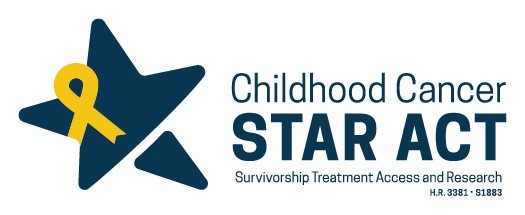
The STAR Act is the most comprehensive childhood cancer legislation ever taken up by Congress. It represents important bipartisan legislation designed to advance pediatric cancer research and child-focused cancer treatments, while also improving childhood cancer surveillance and providing enhanced resources for survivors and those impacted by childhood cancers. For more information, read the press release from the Alliance for Childhood Cancer. Here is how you can get involved:
- Check the cosponsor map to see if your Senators and Representative have signed on.
- Contact your member of Congress and ask him or her to support the STAR Act.
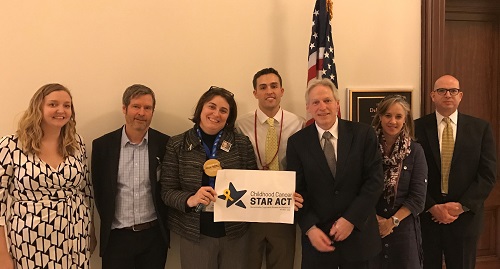
ASPHO Advocacy Committee member Shep Nickel, MD, taking part in Hill visits for the STAR Act.
ASPHO Participates in Childhood Cancer Action Days
ASPHO member Maria Cancio, MD, participated in the Alliance for Childhood Cancer’s 6th Annual Childhood Cancer Action Days. This 2-day event in Washington, DC, brings the childhood cancer community together to advocate for important childhood cancer issues currently before Congress.
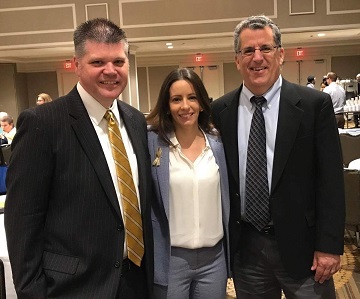
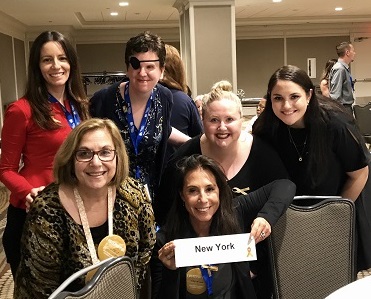
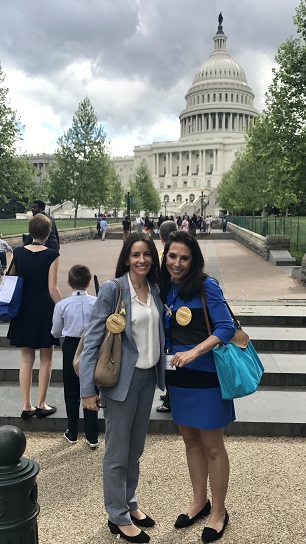
New Liaison Appointed to ASH Government Affairs Committee
ASPHO was invited to appoint a representative to the American Society of Hematology (ASH) Committee on Government Affairs for a 1-year (renewable) term. Dr. Naomi Luban has been serving in this role on behalf of ASPHO, and we thank her for all of her hard work. Dr. Connie Piccone officially began her term as the ASH representative at the March 27, 2017, meeting of the Committee on Government Affairs. Dr. Piccone also will serve on ASPHO’s Advocacy Committee.
Legislative/Regulatory News
ASPHO Represented on Sickle Cell Disease Access to Care Workgroup
To further advance the priorities of the Sickle Cell Disease (SCD) Coalition, three workgroups have been established to focus on specific issues including research and clinical trials, access to care, and global issues. ASPHO will be part of the Access to Care workgroup, which has identified the following items to pursue:
- Compile evidence to share with the Centers for Medicare and Medicaid Services (CMS) regarding alternative payment models for patients with SCD.
- Transition from pediatric to adult care.
- Begin tele-mentoring to improve care for patients with sickle cell disease.
- Become involved in existing and upcoming state legislation for SCD health care.
- Host a Hill Day with patients.
- Conduct a landscape analysis of SCD-coordinated health care delivery models in the United States.
ASPHO Supports RACE for Children Act
The Research to Accelerate Cures and Equity (RACE) for Children Act was introduced to provide needed updates to the Pediatric Research Equity Act (PREA). Currently, PREA does not apply to cancer drugs because children’s cancers occur in different organs than adult cancers. ASPHO has signed on in support of this legislation.
ASPHO Supports BPCA/PREA Recommendations
ASPHO signed on to a position statement providing recommendations to policymakers to strengthen the Best Pharmaceuticals for Children Act and the Pediatric Research Equity Act.
ASPHO Joins Medical Groups in Support of Science
ASPHO joined with some of the world's leading organizations representing clinicians, laboratory researchers, and physician-scientists committed to improving patient care in a statement asking policymakers to protect federal investment in research programs at the Centers for Disease Control (CDC) and the National Institutes of Health (NIH).
National Cancer Institute Releases Annual Report
The National Cancer Institute (NCI) released the Annual Report to the Nation on the Status of Cancer, 1975–2014 with the aim of providing the best perspective on long-term trends in cancer incidence rates (new cases) and mortality rates (deaths) for all races combined.
FDA Accepting Public Comments on Patient Engagement
The Food and Drug Administration (FDA) is establishing a public docket to solicit input on ongoing efforts to enhance mechanisms for patient engagement. The objectives of gathering public comments are to
- develop a nuanced understanding of the patient experience of disease by
- gathering patient perspective on what is clinically meaningful
- assessing attitudes toward benefit-risk and tolerance of uncertainty
- enhancing the science of eliciting and integrating patient input
- support patients and their advocates in understanding regulatory processes and navigating the FDA by
- communicating relevant FDA positions, procedures, and activities
- connecting patients and their advocates with the appropriate resources
- resolving discrete challenges and needs.
Instructions for submitting comments can be found in the Federal Register Notice.
FDA Clinical Trials Consumer Information
The FDA has updated Would Your Child Benefit from a Clinical Trial? This consumer piece is helpful for patients, families, and caregivers.
Cancer Moonshot Funding Opportunities
The 21st Century Cures Act, which was signed into law in December 2016, made $300 million available in fiscal year 2017 for the National Cancer Institute (NCI) to accelerate research efforts aligned with the Cancer Moonshot. The NCI has updated the Cancer Moonshot web page to list all funding opportunity announcements aligned with the goals of the Moonshot program.
FDA Expanded Access Policies
The FDA has a specific section on their website providing information about their current expanded access policies, requirements for enrolling in expanded access programs, and steps individuals can take to get more information.
Legislative Tracking
(All bills of the 115th Congress relevant to pediatric hematology/oncology)
Childhood Cancer Survivorship, Treatment, Access, and Research (STAR) Act (H.R. 820/S. 292)
To maximize discovery and accelerate development and availability of promising childhood cancer treatments, and for other purposes.
Sarah Grace-Farley-Kluger Act (H.R. 1560/S. 528)
To amend the Family and Medical Leave Act of 1993 to provide leave because of the death of a son or daughter.
Research to Accelerate Cures and Equity for Children Act (H.R. 1231)
To amend the Federal Food, Drug, and Cosmetic Act to establish a program to increase the development of new drugs to treat pediatric cancers, and for other purposes.
To prohibit any hiring freeze from affecting the National Institutes of Health and the Centers for Disease Control (H.R. 1561)
Kids First Research Act 2.0 (H.R. 2008)
To increase funding for the 10-Year Pediatric Research Initiative Fund by eliminating taxpayer financing of presidential election campaigns.
Advancing Care for Exceptional Kids Act (S. 428)
To amend titles XIX and XXI of the Social Security Act to authorize states to provide coordinated care to children with complex medical conditions through enhanced pediatric health homes, and for other purposes.
For more information on ASPHO's coalition partners and activities, here are some helpful links:
Alliance for Childhood Cancer
Sickle Cell Disease Coalition
American Society of Hematology
American Academy of Pediatrics
Please visit our Health Policy & Advocacy website section for past issues of Advocacy Brief.
